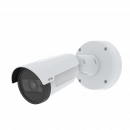
Keeping the trucks rolling
Surveillance and access control technology upgrades at the Port of Suape has eased trucker congestion with the use of Axis network cameras and a suite of software from Pegasus. The new operations have significantly improved operations.
Mission
As one of the main shipping ports in Brazil and Latin America, the Port of Suape was encountering some logistical difficulties due to its own growth. As cargo tonnage continued to increase annually, the volume of vehicles traveling through the port area hindered the flow of traffic and operations. The volume of trucks waiting in long lines to load and offload shipments was taxing the port’s ability to comply with international marine regulations governing port security. They needed to implement better surveillance and access control systems to safely streamline the flow of trucks to and from the piers and port facilities.
Solution
Pegasus Technology, a systems integrator and Axis partner, provided a management platform to expedite the flow of trucks without compromising port security. Central to the solution are 13 bullet-style AXIS P14 Series Network Cameras positioned to automatically capture the license plates of vehicles entering the port. The day/night cameras integrate with a suite of Pegasus applications for scheduling, priority management, access control, data integration, and interpreting license plate images. Port operators use the system to efficiently control traffic, directing truckers to a secure staging area where they are assigned entry times.
Result
Since implementing the automated access control system, truck drivers no longer idle in long lines waiting to enter the complex. Because terminal companies can now coordinate entry assignments, the process of loading cargo goes faster and congestion in the port complex has virtually disappeared. Operators use the captured license plate images to identify every vehicle and driver within their primary area and to determine which terminals they are associated with and when they are scheduled. As a result, Port Suape has seen a significant drop in infractions, irregularities, and aggressive behavior by frustrated drivers.
Axis cameras and Pegasus software have helped us improve security by automatically registering all the vehicles that access the primary area of our port. The cameras capture clear images of license plates and the Pegasus software helps us maintain a safe and steady flow of trucks through our complex. It has greatly improved our operations.
A bustling international seaport
The Port of Suape in northeast Brazil is one of the busiest seaports in Latin America. It serves as a distribution hub for hundreds of companies around the world, moving over 23.6 million tons of cargo annually. In fact, it is responsible for the largest domestic movements of liquid bulk (15 million tons) and cabotage (14 million tons). In addition to a network of access canals for ships loading and offloading goods, the port complex houses operations centers for more than 100 national and international companies whose businesses range from petrochemical processing and liquid gas storage to plastics packaging, building materials, shipbuilding, and food and beverage distribution.

As cargo tonnage increased from year to year, so did the number of trucks required to move goods in and out of the port. The situation was reaching a critical point. Truck drivers were entering the port complex and parking in areas never designed to accommodate that volume of drivers. They began complaining about the long lines and wait time, sometimes days, to complete their transactions with terminal companies. Port authorities were also complaining about the disruptive congestion, and it did not comply with the requirements of the International Ship and Port Facility Security Code (ISPS Code).
With no vehicle access control system, Suape was finding it difficult to maintain compliance with international maritime regulations for port security. It was clear they needed help.
Creating efficient and secure access control
Port authorities turned to Pegasus Technology, a systems integrator and Axis partner, to devise a solution that would strengthen security and improve access control to port terminals. The totally integrated solution links Axis security cameras with a suite of Pegasus management software to tightly regulate the flow of traffic from a staging parking area through the entry gate of the port complex and onto individual terminals.

Automated control begins when a truck enters the designated staging area outside the port gates. Upon arrival, an Axis camera captures the license image and Pegasus’ PlateView, video analytics embedded in the camera, translates the pixels into actionable data. That data informs the other Pegasus software modules used to schedule entry times for each driver, restricts access to the port until a trucker’s appointed time slot, and integrates information with other terminal companies’ logistics systems.
When the system matches a license plate with a timed entry assignment, it displays the clearance report on LED panels alongside the road. As drivers leave the staging area, they check the display. If they don’t see their plate cleared for access, they’re instructed to enter the turnaround lane and wait their turn.

At the main gatehouse there’s another checkpoint where additional Axis cameras capture license plates. The analytics verifies that the truck associated with that plate has arrived within an hour of its scheduled entry time. If so, the system automatically opens the gate.
As an added safety and security measure, the port’s operations team supervises the process from the Port of Suape’s Access Control Center. “If there’s a problem, an operator can correct a wrong license reading, grant or deny access to a vehicle that has arrived without proper scheduling or authorization, or manually trigger the gate for a turnaround,” says Amaro Monteiro, developer and integrator for Pegasus Technology. “But with our new integrated system, those incidents don’t often happen.”
While the initial purpose for the project was to manage the growing volume of trucks entering the port and maintain security, the Pegasus solution also handles entry authorization for thousands of employees, visitors, and service vehicles passing through Suape’s main gate.

Cameras that can handle fast-paced operations
Pegasus chose AXIS P14 Series cameras for the port installation because of their exceptional reliability in capturing license plates and their seamless integration with the Pegasus PlateView analytics, which uses deep learning to recognize Brazilian and Mercosul license plate patterns. “High quality image processing is an essential part of the scheduling, parking management, and access control,” explains Monteiro. “With Axis we’re able to obtain a high rate of success even with the port’s high-volume, fast-moving traffic – whether in bright daylight or the dead of night.”
The Axis cameras currently log about 15,000 plates a day, many of which are dirty or damaged. Despite the challenges, the cameras have performed well and rarely require human intervention.
“It’s an ideal great solution because it allows Suape’s managers, terminal companies, and staging team to monitor activity and access detailed status reports 24/7,” shares Monteiro.
Overcoming trucker resistance to change
Implementing the system was no easy task. But the biggest challenge wasn’t technical; it was human resistance to change. “For years, truckers came and went on their own schedule,” shares Monteiro. “Now they were going to have to abide by rigid rules to gain access to the port.”
In the past, schedules were sent by email, text, or phone – oftentimes when the trucker was already waiting at the entry gate. Now they would have to report to a staging area to obtain an assigned entry time. It was a necessary culture shift to ensure that the port maintains compliance with international maritime regulations for port safety and security.
The changeover was further complicated by the fact that it was occurring during the height of the COVID-19 pandemic. But in many ways, the timing couldn’t have been better because the Port of Suape was able to use the Axis cameras and video analytics to enforce social distancing and minimize physical contact between drivers in the staging courtyard and with the operational team in the port complex.

From managing on the fly to organized control
Since adopting the Pegasus/Axis solution, port authorities have been able to register and assign credentials, authorizations, and schedules to every person and vehicle before they enter Suape’s gates. Operators now routinely use the license plate captures to identify and track vehicles and drivers as they load and offload cargo in the complex to prevent them from entering restricted areas.
While studies are still underway to determine the port’s return on investment, port directors have been pleased with the greater control afforded by the new integrated system.

“Today we possess an organized register of all the vehicles that access the primary area of the port,” says Pablo Teixeira, executive coordinator of Informational Technology of Port Suape. “We’re able to integrate operations between the staging courtyard and the terminal companies within Suape’s complex, which helps to minimize congestion and speed up operations.”
Since going live, Teixeira reports seeing a significant drop in accidents, incidents of violence, and other problems within the Port Suape complex. “The Pegasus/Axis solution represents a welcome change from the way we used to operate,” says Teixeira.
Products & solutions

Cargo & logistics
Our partner organizations
Get in touch
Want to know how you can benefit from Axis solutions? Get in touch and we will help you.
Contact us


